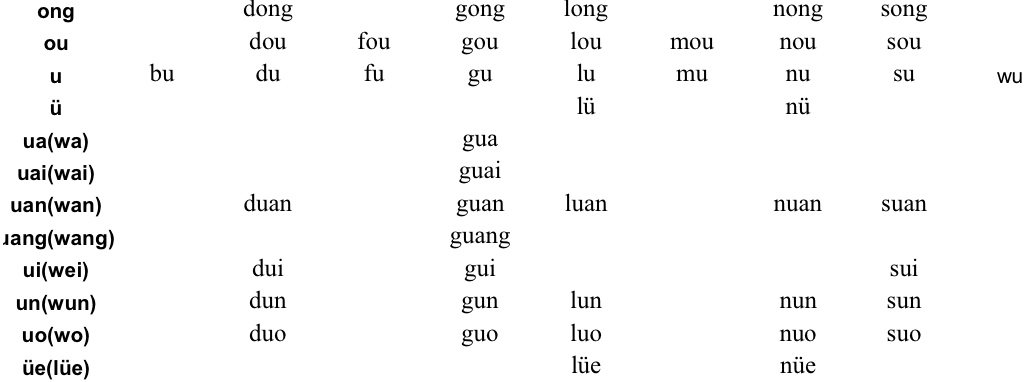Sound Primer TOC | Introduction | SF Introduction | SF Pt. 1 | SF Pt. 2 | SF Pt. 3 | Syllable Initials
dong...gong...long...nong...song
dou...fou...gou...lou...mou...nou...sou
Once again, make sure you are making a clear /u/ sound and that your are NOT rounding your lips for it, as this is the biggest English speaker tendency.
bu...du...fu...gu...lu...mu...nu...su...wu
Once again, there is an English tendency to round the lips here. Make sure your lips are completely stationary when making this sound.
lü...nü
You get this sound by making the "eeee" sound (/i/) with rounded lips. If you are familiar with French, it's the same sound as in the word "lune", or in the German word "über". It does not exist in English.
The rest of the Finals are the same as the ones above but with a "w" sound in front. For example, the only difference between "gai" and "guai" is the "w" sound in between the initial consonant and the vowel sound. Listen closely and mimic.
gua
guai
Avoid the English speaker tendency to drag the beginning of this sound out like in the English word "why".
duan...guan...luan...nuan...suan
The pronunciation of this "a" varies from accent. It can be a clear /a/ sound for something more CLOSE.
guang
dui...gui...sui
Avoid the English speaker tendency to draw the beginning of this sound out like in the English word "way".
dun...gun...lun...nun...sun
The vowel here is the same as in the English word "good".
duo...guo...luo...nuo...suo
Make sure you are making that open vowel sound from the "o" final (e.g. bo...fo...mo...wo). A common English speaker tendency is to pronounce this with an "ou" sound, as in the English word "whoah!".
lüe...nüe
Same as the ü sound but with an /e/ at the end.
Mandarin Vowel Submission
Now that you are familiar with all the above Mandarin vowel sounds and their pinyin spellings, it's time to narrow down the few sounds that are problematic for you.
- Unlike my fast recordings, be sure to leave a clear space between each syllable so that I can more easily pinpoint it on your uploaded track.
- Read the chart row-by-row, from left to right, working your way down.
- Title your track: Mandarin Syllable Finals Part 3 - (Your Name)
Once you are comfortable with all the sounds on this page, give your mouth a rest or move on to the next section - Syllable Initials.
Sound Primer TOC | Introduction | SF Introduction | SF Pt. 1 | SF Pt. 2 | SF Pt. 3 | Syllable Initials


